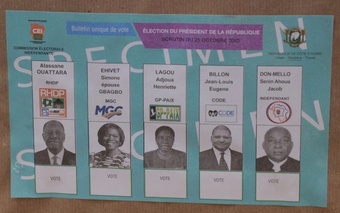Nearly 8.7 million voters are expected to elect the next
president of Côte d'Ivoire, a country of 32 million and the region's most
dynamic economy.
Ouattara, 83, has been in power since 2011. Facing him
are four challengers, mostly political outsiders – apart
from Simone
Gbagbo, ex-wife of former president Laurent Gbagbo.
Commerce minister and businessman Jean-Louis
Billon is the youngest candidate at 60. Two women are competing to
become the country's first female president: former first lady Gbagbo, 76, and
Henriette Lagou, 66, a women's rights campaigner who stood unsuccessfully in
2015.
Civil engineer and former minister Ahoua Don Mello, 67, is
the fifth candidate, running as an independent.
pposition candidates excluded
Côte d'Ivoire's most prominent opposition politicians,
however, are not in the race. Former president Laurent Gbagbo was
barred from standing, as was former international banker Tidjane Thiam, the
candidate of one of the country's main political parties, the PDCI-RDA.
The constitutional council eliminated them on the grounds they had been removed
from the electoral roll – Thiam because of nationality-related legal issues
stemming from him acquiring French citizenship, and Gbagbo for a criminal
conviction.
Their absence added to a tense political climate, with their
supporters calling for protests and the authorities banning rallies on the grounds of public safety.
None of the remaining four candidates seeking to unseat
Ouattara represents an established party – unlike the president, who heads the
ruling RHDP.
Major security deployment
Some 44,000 security forces have been deployed nationwide in
the run-up to the vote.
Three people died over the past few weeks and more than 700
were arrested as marches were quashed. Around 30 people were sentenced to three
years in prison for disturbing public order.
The authorities said they did not want to see a repeat of
the election unrest of 2020, when 85 people died.
Ouattara himself came to power after a violent crisis
followed the 2010 contest. More than 3,000 people were killed in clashes
between his supporters and those of Gbagbo, who ruled for a decade before him.
Regional loyalties
Turnout is a crucial issue, with analysts saying it could
follow regional lines.
Ouattara's traditional stronghold is in the north, while
southern and western regions are home to groups that historically
supported Gbagbo or the PDCI.
"Since the end of one-party rule in 1990 and the rise
of multipartyism, the political debate in Côte d'Ivoire has begun to
tribalise," says historian Hyacinthe Bley of Félix Houphouët-Boigny University in
Abidjan.
This has led to tensions, even a coup in 1999 and a civil
war after the 2010 election.
"The country is still divided between the north and the
south," Bley told RFI, "and no one has forgotten the violence of the
war of 2010 to 2011. The presidential election of 2015 was more peaceful,
but the reconciliation is still not complete."
According to Bley, people in Côte d'Ivoire still vote for a
person rather than a party, which makes the absence of opposition heavyweights
significant.
"The absence of the two main opponents will demobilise a significant portion of the electorate, and so far we haven't seen a significant shift behind a candidate," William Assanvo, a researcher at the Institute for Security Studies, told AFP news agency.
If no one wins a majority in Saturday's vote, the election will go to a second round between the two top candidates.


 Take Voters' Compass
Take Voters' Compass